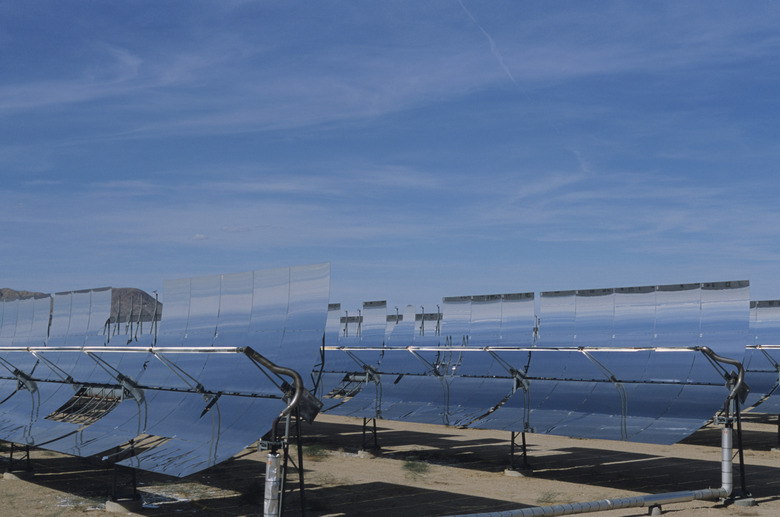Does A Solar Panel Stop Working When It Gets Too Cold?
A solar panel will not stop working when it gets cold. In fact, extreme heat poses more of a threat to the functioning of a solar panel than extreme cold. As temperature increases, solar panels produce less power for a given amount of solar energy. Conversely, as it gets colder, solar panels will produce more power.
Inside the Solar Panel
Inside the Solar Panel
Solar cells create electricity when the electrons in the cell's atoms are excited by energy in sunlight. The outermost electrons in the atoms exist at an energy level called the valence band. When they get enough energy from sunlight, the electrons jump to an energy level called the conduction band. When a cell is heated, the difference between the valence band and the conduction band decreases. Therefore, while the electrons may be freed more easily in hot temperature, they do not carry as much energy when they are released.
Voltage, Current and Power
Voltage, Current and Power
Voltage is the electrical potential difference between two points. Current is the measure of the flow of electricity through a unit area. Power is the product of voltage and current. When a cell gets cold, the voltage increases while the current decreases. Each electron carries more energy, but fewer electrons flow. The increase in voltage is greater than the decrease in current. Hence, power output increases. When the cell gets hot, the voltage decreases but the current increases. Again, the change in voltage is greater than the change in current. Hence, the power decreases.
Efficiency Change with Temperature
Efficiency Change with Temperature
The efficiency of a solar panel is the percentage measure of the output power of the panel relative to the available total solar energy. For example, a 15 percent panel would produce 150 watts from an available 1,000 watts of solar energy reaching its surface. The.efficiency of a panel decreases by approximately 0.05 percent for every one degree Celsius increase in temperature. Conversely, the efficiency of a panel increases by 0.05 percent for every one degree Celsius decrease in temperature.
Factors that Influence Cell Temperature
Factors that Influence Cell Temperature
Just because it's cold outside does not mean that the panel itself is cold. Solar cells release some energy as heat. Depending on the way in which the panel is mounted and the surrounding air conditions, this heat could affect the operating temperature of the panel. For example, a roof mounted panel will not ventilate heat as well as a freestanding one. This will increase the heat of the panel and therefore decrease the efficiency. Wind, on the other hand, helps carry heat away from the cells. Therefore, a cold, windy day is ideal for generating solar electricity. This will increase the panel's power output and dissipate the panel's own heat.
Cite This Article
MLA
Murmson, Serm. "Does A Solar Panel Stop Working When It Gets Too Cold?" sciencing.com, https://www.sciencing.com/solar-panel-stop-working-gets-cold-8161/. 24 April 2017.
APA
Murmson, Serm. (2017, April 24). Does A Solar Panel Stop Working When It Gets Too Cold?. sciencing.com. Retrieved from https://www.sciencing.com/solar-panel-stop-working-gets-cold-8161/
Chicago
Murmson, Serm. Does A Solar Panel Stop Working When It Gets Too Cold? last modified March 24, 2022. https://www.sciencing.com/solar-panel-stop-working-gets-cold-8161/
